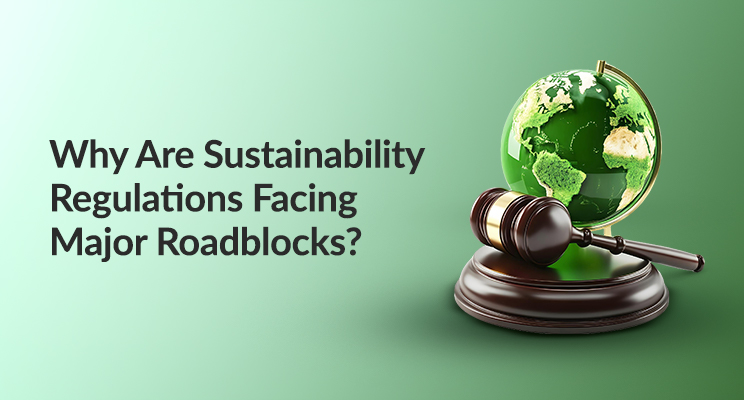Have you ever wondered why, despite widespread awareness of climate change, we aren’t seeing more progress on sustainability? Picture this: a small manufacturing company in the Midwest, struggling to meet new environmental regulations while trying to keep its doors open. They want to transition to renewable energy but are overwhelmed by the costs and uncertainty.
This story is all too common in today’s world, where the push for sustainable practices often collides with economic realities. As we explore the key challenges facing sustainability regulations, we’ll see how businesses and governments can work together to overcome these obstacles.
What Are the Major Roadblocks for Sustainability Regulations?
Economic Concerns and Industry Pushback
The drive for greener policies aimed at reducing carbon emissions often clashes with economic realities. Here are some specific challenges:
Costs of Compliance: Shifting to renewable energy or adopting new technologies can be expensive. For many companies, especially those in energy-intensive industries, the upfront costs may seem prohibitive. For instance, a small factory might find it difficult to invest in solar panels or energy-efficient machinery.
Job Losses and Economic Disruption: Industries like fossil fuels and heavy manufacturing employ millions of workers. When regulations push these industries to change their practices, it can lead to job losses. For example, when coal plants close due to stricter emissions regulations, entire communities can suffer economically.
Uncertainty and Regulatory Risks: Businesses often hesitate to make necessary changes because they’re unsure about future regulations. This unpredictability creates market instability, discouraging long-term investments in sustainable initiatives.
Political Resistance and Policy Gridlock
Even with scientific consensus on climate change, political challenges often stall progress:
Influence of Lobbying Groups: Powerful lobbying efforts from industries threatened by sustainability regulations—like fossil fuels—can sway policymakers. These groups argue that regulations will hurt jobs and economic growth, slowing legislative progress.
Policy Deadlock: Even when there’s political will to pass sustainability laws, the legislative process often experiences delays. Politicians may struggle to balance environmental goals with economic growth, leading to stagnation.
Lack of Coordination Between Government Levels: Different levels of government—local, state, and national—sometimes don’t work together effectively. Without a unified strategy, regulations may be poorly enforced or inconsistently applied.
Technological and Infrastructure Limitations
Achieving ambitious sustainability goals requires significant advancements in technology and infrastructure, yet not all countries or industries are equipped with the necessary resources to meet these requirements. Major technological and infrastructural barriers include:
High Costs and Limited Development: Technologies needed for reducing carbon emissions, like carbon capture and storage (CCS), can be expensive and not yet commercially viable on a large scale. A startup trying to implement CCS may find it financially daunting without substantial investment.
Infrastructure Gaps: Many regions lack the modern energy grids or waste management systems required to support widespread renewable energy use or sustainable agriculture practices.
Global Coordination Challenges
Sustainability requires coordinated global efforts, but differing regulations complicate this task.
Uneven Regulatory Frameworks: The variation in sustainability regulations across countries creates an unbalanced playing field. Businesses operating in countries with strict laws may face higher costs than those in nations with lax regulations. This discrepancy can lead companies to relocate operations to regions with weaker laws—a phenomenon known as “carbon leakage.”
Inconsistent International Cooperation: While some countries are leading in adopting sustainability regulations, others lag behind due to various reasons. This inconsistency slows progress on addressing global issues like climate change.
Enforcement and Compliance Issues
Even when strong sustainability laws are enacted, their success depends heavily on enforcement.
Lack of Resources: Environmental agencies tasked with enforcing sustainability regulations are often underfunded and understaffed. This hampers their ability to monitor compliance effectively.
Weak Accountability Mechanisms: Without strong accountability systems in place, businesses may disregard sustainability requirements without fear of consequences. This lack of accountability can undermine the effectiveness of regulations.
Transparency and Oversight Gaps: A lack of transparency in environmental reporting allows companies to underreport emissions or environmental damage. Greater scrutiny is essential for ensuring compliance with sustainability laws.
Overcoming the Hurdles to Sustainability Regulation
Strengthened Political Will: Governments must focus on sustainability instead of giving in to lobbying pressure. Strong political leadership can drive the regulatory changes needed for a sustainable future.
International Cooperation: Global alignment on sustainability goals is essential. Organizations like the United Nations can help facilitate cooperation among countries.
Investment in Technology and Infrastructure: Both governments and private sectors should invest in developing sustainable technologies and infrastructure. These investments will enable industries to meet sustainability goals without sacrificing economic growth.
Robust Enforcement Mechanisms: We need greater transparency and stronger accountability systems to ensure compliance with regulations. Well-funded enforcement agencies are crucial for monitoring adherence.
Actionable Takeaways for Individuals and Businesses
As individuals and businesses, there are practical steps we can take to support sustainability regulations.
Advocate for Change: Engage with local representatives about the importance of sustainability initiatives in your community.
Invest in Green Technologies: If you run a business, consider investing in renewable energy sources or energy-efficient technologies that reduce your carbon footprint.
Educate Yourself and Others: Stay informed about environmental issues and share knowledge with friends and colleagues to raise awareness about the importance of sustainable practices.
Sustainability regulations are critical for addressing our planet’s environmental challenges, yet they face significant obstacles that slow their implementation. By tackling economic concerns, political resistance, technological limitations, and global coordination issues through collaboration and investment, we can pave the way for a sustainable future for generations to come.


